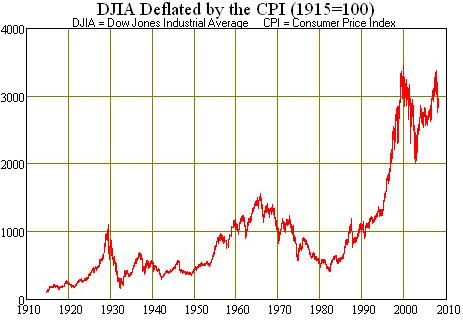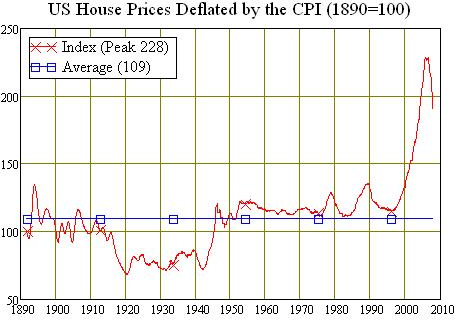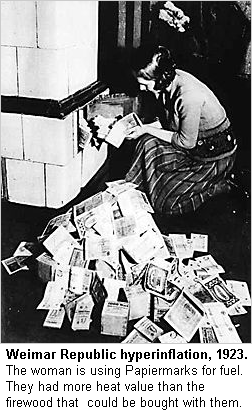Last Days of Present Economic Order
By Paul J. Dickson 10th November 2008
On 29th September the Federal Reserve created a $50 billion line of credit to support the market value of the US dollar (kind of like the seller bidding up his own wares at an auction!) through the Exchange Stabilization Fund.
The US financial crisis continued to deepen through October, however, as the collapsing value of CDOs (Collaterelized Debt Obligations - basically sub-prime mortgages) began to expose another valueless financial instrument, the CDS (Credit Default Swap - essentially, insurance against a Collateralized Debt Obligation proving worthless, often sold to the investor by the same company that sold them the CDO!!!)
 Wow! And these guys are supposed to be smart? Wow! And these guys are supposed to be smart?
On 21st October, less than one month later, the Federal Reserve found it necessary to increase the line of credit - through a newly created MMIFF (Money Market Investor Funding Facility - with essentially the same function as the Exchange Stabilization Fund) - to $540 billion... a tenfold increase in the cash judged necessary to prevent a collapse... in just 22 days.
The underlying problems, just to put the thing in perspective are a global market in Credit Default Swaps of an estimated $60 trillion (could be plus or minus 50%, that's how uncontrolled this thing is) (60MinutesVideo) and a global market in general derivatives of $600 trillion. The record and now irredeemable US national debt, by contrast, is a paltry $10 trillion, against a gross domestic product (2007) of $14 trillion. So, if anyone imagines that $660 trillion can somehow be "written off", then they could probably benefit from re-studying Luca Pacioli's 15th century "Summa de Arithmetica"! When liabilities exceed assets, the proper term is "insolvency"... and what necessarily follows is "bankruptcy".
It is interesting that unlike all previous credit financed investment bubbles, the South Seas Bubble, the 1929 Bubble, and so on, this one is based on two simultaneous underlying asset bubbles, real estate and stock market investments, or even three if you count the inflated foreign exchange value of the dollar. In the 1929 stock market crash, for example, real estate values were not inflated, in fact they were at an all-time low, and the US dollar which was a major currency but not the world's reserve currency - that role still belonged to British Sterling - was strong and remained stable. And yet the effects of that crash were felt around the world.

Today we have a far more precarious situation, in which not only are stock market and real estate assets over-valued to an unprecedented extent, but the U.S. dollar itself, the reserve currency of organized global trade and the main investment asset of several major economies (Eg. China, Japan and the U.K.) now enjoys a real exchange value estimated at just 30¢. The collapse of a “reserve currency” is something that has happened before. It happened in 1931. The stock market crash of 1929 is what is most widely remembered but Britain's default on the gold standard in 1931 had a far wider and more serious effect. Germany, Russia and Japan, the other leading industrial nations at the time, were left without a means of purchasing oil. And this lead directly to their need for territorial expansion to secure oil supplies, and culminated in the Second World War. The economy of the US, will collapse, that is unavoidable, because it is now bankrupt. That is a simple accounting equation. And it will collapse precipitately because so many asset values are going to decline simultaneously. And it is likely to do so within months since the process has already started. Economists in fact speak of the BNP Parisbas default in 2007, fifteen months ago, as having marked the beginning of the present financial “meltdown”.
In the “blame game” that the media so loves to play to grab our attention to their “product promotions”, the analyses are fundamentally fraudulent, as usual. Wall Street speculators and the designers and marketers of such instruments as the credit default swap, are being fingered and will be continue to be blamed, in much the same way that speculators were blamed for the 1929 crash that was skillfully engineered through the money-supply manipulations of the Bank of England, in collusion with other central banks. Elected representatives are also likely to be taking quite a bit of heat in the days to come, but all of this is nonsense and scapegoating... of which the media are the peerless instigators. The real causes go back to oil geopolitics and the suicidal mechanism of U.S. deficit-financing of the free-marketized, globalized economy. But primary responsibility for the easy-money policy that fuelled the bubble(s) rests sqarely with the U.S. Federal Reserve. Their actions have been criminal and even beyond, to the point of genocidal. So two question become relevant: How will the collapse proceed and what, if anything at all, can an ordinary person do to prepare for it?
The “how” of it The “how” of the thing is important because it tells us what the options are going to be. The debt-noose, even with respect to working captial, around the neck of North American businesses is so tight that a collapse of the financial sector will result in the almost immediate cessasation of most corporate business activity. That will mean, of course, the imposition of martial law. The average North American city may happen to warehouse as much as one months supply of food , but that is doubtful and of course most fresh foods (fruit, vegetables, meat and dairy and sometimes even bread) depend on long supply chains and would disappear in a week if those distribution systems were to be disrupted. For the remaining supplies to last even a week would require the implementation of not only martial law but food rationing as well. This means that the majority of people could be reduced to a hand-to-mouth existence within months. Another critical material for survival in North American is auto fuel, primarily gasoline. Without gasoline, a large proportion of the population that lives remote from centralized food distribution hubs, will face the option of either moving and thus risking homelessness, or starving. The final critical necessity is a medium of exchange. As far as paper money is concerned, economic collapse is often associated with hyperinflation. Historical evidence, including the Weimar Republic (1923), Yugoslavia (1980's), Bolivia (1985) and Ukraine (1990's), shows that hyperinflation can reduce a currency to virtual worthlessness in 12 months or less. Gold and silver may lose a half or even three quarters of their value but they cannot become worthless, as paper money can. The problem with metals, though, is that they are primarily useful as long term hedges. In a situation of semi-lawlessness, which is what we might expect and what people experienced in Russia in the 1990's, precious metals may prove to be impractically difficult to protect against theft and extortion. These brief considerations are sufficient for our purposes here. In a worst-case outcome, it is clearly possible that homelessness and starvation could be visited on millions of North Amricans within a year. And it is this reality that should guide the priority and approach to our preparations. What is to be done?
What is to be done? As V.I. Lenin's pamphlet of 1902 (borrowing its title from Nikolai Chernychevsky's 1863 utopian novel) asked, we too now ask. What is to be done to prepare for the avalanche that the dialecticians of our new utopian future (with 95% less human beings on the earth) have sent down the slope towards us? Option 1 – Do nothing, rely on the governemnt... and crack another beer. This is dumb and you know it's dumb! Even if you only phone someone and make peace with them or buy in a couple of extra jars of coffee, you will have done something... and you will feel better for it. As far as government help is concerned, you may be surprised to know that most Western governments, following U.N. protocols, are generally agreed that overpopulation is now the wold's most urgent problem. Not only might they lack the ability to save you but they could lack the will as well. 
Option 2 – Do everything and wait for everyone else to die.
Buy 3 year's food and rocket-propelled grenades and fortify your home and hide in the basement. Only the rich will be able to do this and many of them, it will one day be discovered, have already done it. Those who will “pull the plug” on the economy know when the day is to be and have long been preparing themselves to survive it. For the rest of us it is just not a practical option. Option 3 – Do something and avoid giving up hope. Buy some bulk dried foods and multivitamins. Put in a woodstove. Buy some hardware supplies and basic tools (always highly tradeable items). Simplify your life. Other basic commodities that will keep their value (or appreciate) will be rolls of cloth, especially heavy-duty fabrics, and sewing machines. All kinds of clothing and footwear and winter clothing. Blankets, sleeping bags and camping equipment of all kinds. Kitchen equipment. Batteries and battery chargers. Personal hygiene supplies. Medications and medical supplies, including antiseptic ointments and bandages. And such like things. You should obviously give preference in your buying to things that fall within your own areas of expertise. If you are good in the kitchen, concentrate on kitchen stuff. If you are good in the laboratory or workshop, concentrate on essential tools, instruments and materials from those areas. Do not forget that with the fatal pollution - by genetic modification - of major food crops, the value and usefulness of heritage seeds will increase rapidly. Seeds are also compact and easy to store. One final thing is that you need to be aware of is that U.S. and Canada, and some European countries, have enabled penal anti-hoarding legislation to be brought in under martial law. They will have rights of search and seizure of any food found in your home in excess of one months supply, regardless of when it was purchased. This is drastically unfair, of course, but it does show you that they mean business with respect to starving the populace. (If they had meant you not to starve they would have encouraged you to store food... don't you think?)
|
 Home
Home  News Archive
News Archive  Last Days of Present Economic Order
Last Days of Present Economic Order





 Wow! And these guys are supposed to be smart?
Wow! And these guys are supposed to be smart? 







